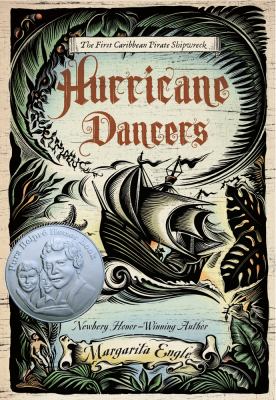
by Margarita Engle
Publishers Weekly Newbery Honor-winner Engle (The Surrender Tree) continues to find narrative treasure in Cuban history. Like her other novels in verse, this one is told in multiple voices (too many, in fact), some based on historical figures. The action takes place in the early 16th century aboard a pirate ship captained by Bernardino de Talavera, a failed landowner who literally worked his Taino farmhands to death then, rather than face prison, stole a ship and became the first pirate of the Caribbean. He kidnaps an orphaned boy to translate for him and takes a hostage-the powerful governor of Venezuela, whose actions in the New World have been as despicable as Talavera's. After a storm wrecks the ship, all three wash up on Cuba's coast among a native population, and two new voices and a new plot thread are introduced. The story, based on historical events, feels too rich for Engle's spare, broken-line poetry. Still, the subject matter is an excellent introduction to the age of exploration and its consequences, showing slavery sinking its insidious roots in the Americas and the price paid by those who were there first. Ages 12-up. (Mar.) (c) Copyright PWxyz, LLC. All rights reserved. (c) Copyright PWxyz, LLC. All rights reserved School Library Journal Gr 6-10-It's been said that history is written by the conquerors and, indeed, there are countless one-sided accounts of brave European explorers boldly "discovering" the New World. Here's a welcome antidote to all that biased mythology. Written in unrhymed verse and from alternating characters' perspectives, Hurricane Dancers provides a much more nuanced, personal, and thought-provoking imagining of what really happened when diverse cultures began colliding in the Caribbean in the late 15th and early 16th century. The story centers around a young slave dubbed el quebrado, "The Broken One," whose half-Spanish, half-Taino Indian ancestry makes him critically valuable as a translator for the sailors, who exploit his skills to intimidate and enslave the Natives they encounter. He is a captive on a stolen pirate ship commanded by Bernadino de Talavera as the tale begins, but the tables turn when a hurricane dashes the vessel off a Caribbean Island. Quebrado, Bernadino de Talavera, and his brutal conquistador hostage Alonso de Ojeda all survive, but when the former commander once again tries to employ Quebrado's skills to dominate the Natives, the young man realizes that he not only has the power to refuse and reinvent himself, but also finds that he controls the fate of his former captor and his injured, unstable hostage. Unique and inventive, this is highly readable historical fiction that provides plenty of fodder for discussion.-Jeffrey Hastings, Highlander Way Middle School, Howell, MI (c) Copyright 2011. Library Journals LLC, a wholly owned subsidiary of Media Source, Inc. No redistribution permitted. (c) Copyright 2010. Library Journals LLC, a wholly owned subsidiary of Media Source, Inc. No redistribution permitted. Book list *Starred Review* Engle, whose award-winning titles include the Newbery Honor Book, The Surrender Tree (2008), offers another accomplished historical novel in verse set in the Caribbean. Young Quebrado's name means the broken one, a child of two shattered worlds. The son of a Taino Indian mother and a Spanish father, he is taken in 1510 from his village on the island that is present-day Cuba and enslaved on a pirate's ship, where a brutal conquistador, responsible for thousands of deaths throughout the Americas, is held captive for ransom. When a hurricane destroys the boat, Quebrado is pulled from the water by a fisherman, Narido, whose village welcomes him, but escape from the past proves nearly impossible. Once again, Engle fictionalizes historical fact in a powerful, original story. With the exception of Quebrado, all the characters are based on documented figures (discussed in a lengthy author's note), whose voices narrate many of the poems. While the shifting perspectives create a somewhat dreamlike, fractured story, Engle distills the emotion in each episode with potent rhythms, sounds, and original, unforgettable imagery. Linked together, the poems capture elemental identity questions and the infinite sorrows of slavery and dislocation, felt even by the pirate's ship, which remembers / her true self, / her tree self, / rooted / and growing, / alive, / on shore. --Engberg, Gillian Copyright 2010 Booklist From Booklist, Copyright © American Library Association. Used with permission. |